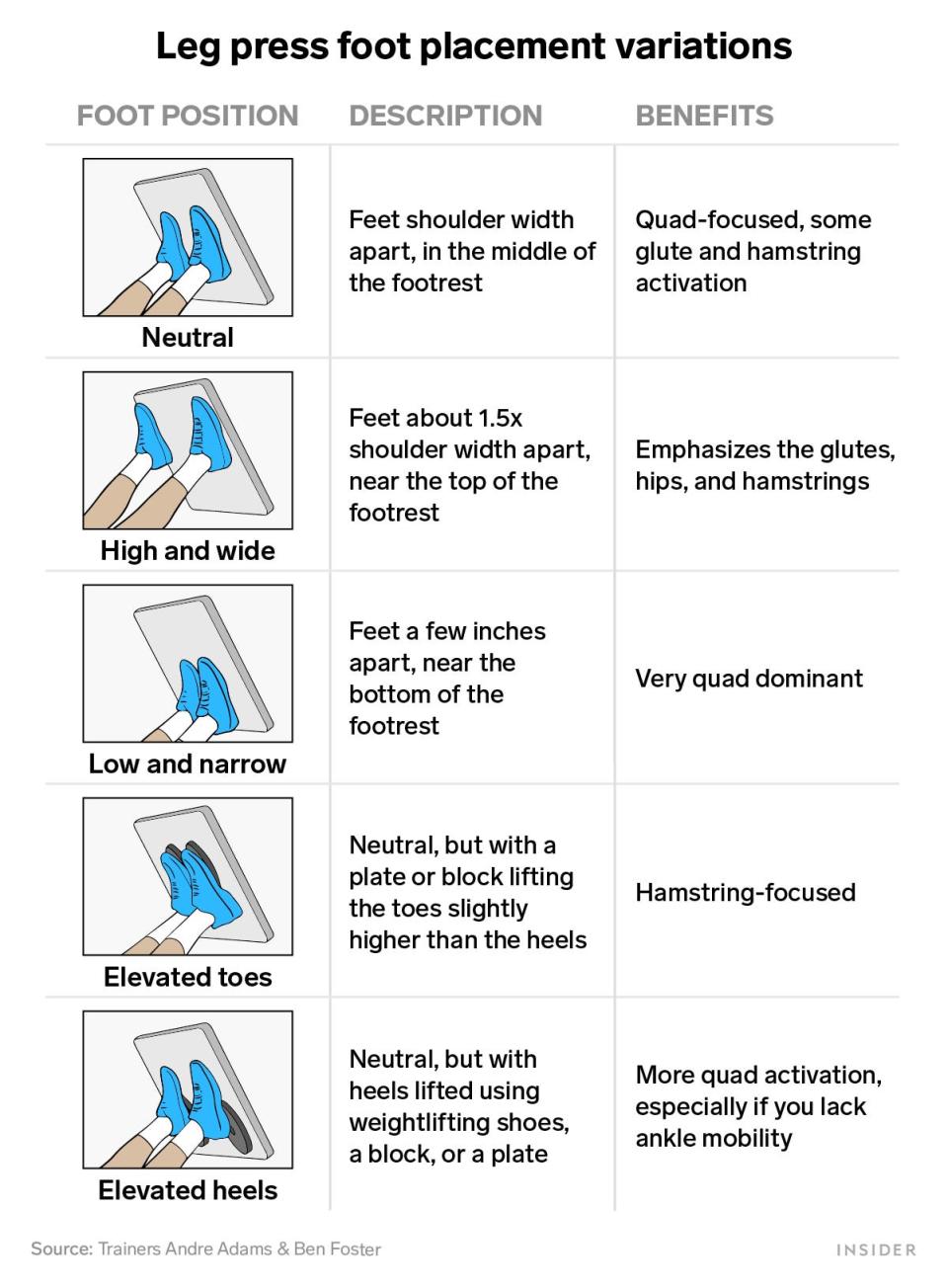Foot placement matters during a leg press workout. Here's where to place yours for different muscle gains, according to trainers.

Leg press exercises can be modified for different goals based on your foot position, trainers say.
Variations can target your glutes, hamstrings, or quads to build muscle and strength.
Fitness beginners may want to focus on the basics first, however.
The leg press machine can help build strength and muscle in the lower body. To get the most of the machine, focus on where you position your feet based on your goals, according to personal trainers.
Targeting different muscles can be useful whether you want to focus on building bigger glutes, or beefing up your quads, but it also improves performance and prevents injury by helping you work on imbalances, NASM master trainer Andre Adams told Insider.
Changing your foot position can prompt your quads, glutes, or hamstrings to work harder to make more gains in those areas, he said.
Leg press variations can also help you find the best exercise for your body, especially for people with mobility issues, according to Ben Foster, head coach and founder of the People's Athletic Club.
No matter which variation you choose, you'll use all your lower body muscles to some extent, but trying different variations in a workout can help you maximize your gains, the trainers said.

The leg press is great for quads, and a low, narrow stance can boost the benefits
When you perform a leg press, the movement is primarily powered by the the quadriceps (quads), the large muscles on the front of the thighs. To tap into the quads even more, you can place your feet lower on the platform, closer together, or both, the trainers said.
In both cases, the change in position will increase the angle of flexion (bend) in your knee during the exercise, creating a greater range of motion for the quads to work through.
If you have knee or ankle issues, you can get similar benefits by using a plate or weightlifting shoe to elevate your heel, Foster said.
For more glute and hamstring activation, go high and wide
In contrast, placing your feet higher on the machine plate, or further apart from each other, will focus more on the backs of your legs, the glutes and hamstrings.
The wider, higher stance works by reducing the angle of your knee, according to Adams.
"You're limiting quad involvement, so hamstrings and glutes have to do more work," he said.
Using a plate or block to elevate your toes can also help focus the exercise on your glutes and hamstrings.
Which variation is best depends on individual body mechanics and preference, and trying them out can help you learn to properly activate the right muscles, Foster said.
"You have to just play around with these positions and see what works best for you. You should be able to feel the muscle that you're working," he said.
Beginners should focus on the basics, trainers say
If you're a newer athlete, it's best to master the standard leg press before trying different foot positions, trainers said.
"We want to make sure everything is moving the way it should before we get into those variables," Adams said.
Beginners working on general fitness may not want to focus on the leg press at all, he added.
You can develop better form, stability, and a rock-solid foundation by starting with dumbbells, kettlebells, barbells, or your bodyweight since they force you to move with control, compared to a machine that uses a limited plane of motion, Adams said.
Good examples include "prisoner" squats (with hands behind your head), and single leg "pistol" squats to train balance, mobility, and strength in your legs and core.
And for the most bang for your buck, exercises like a dumbbell squat and press can help you work on your whole body at once without spending extra time in the gym.
Read the original article on Insider

 money
money 